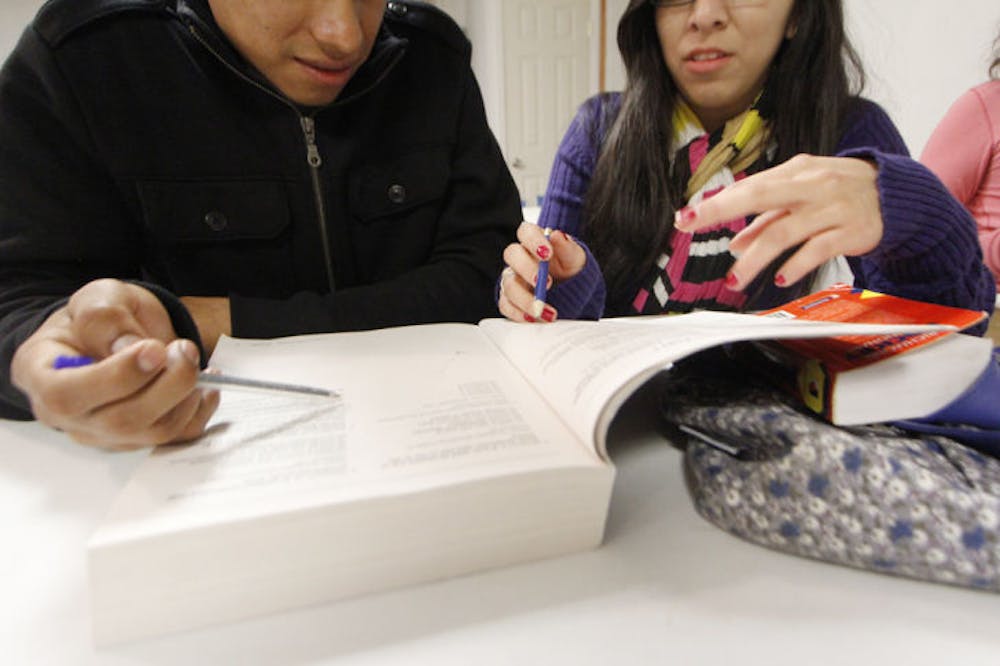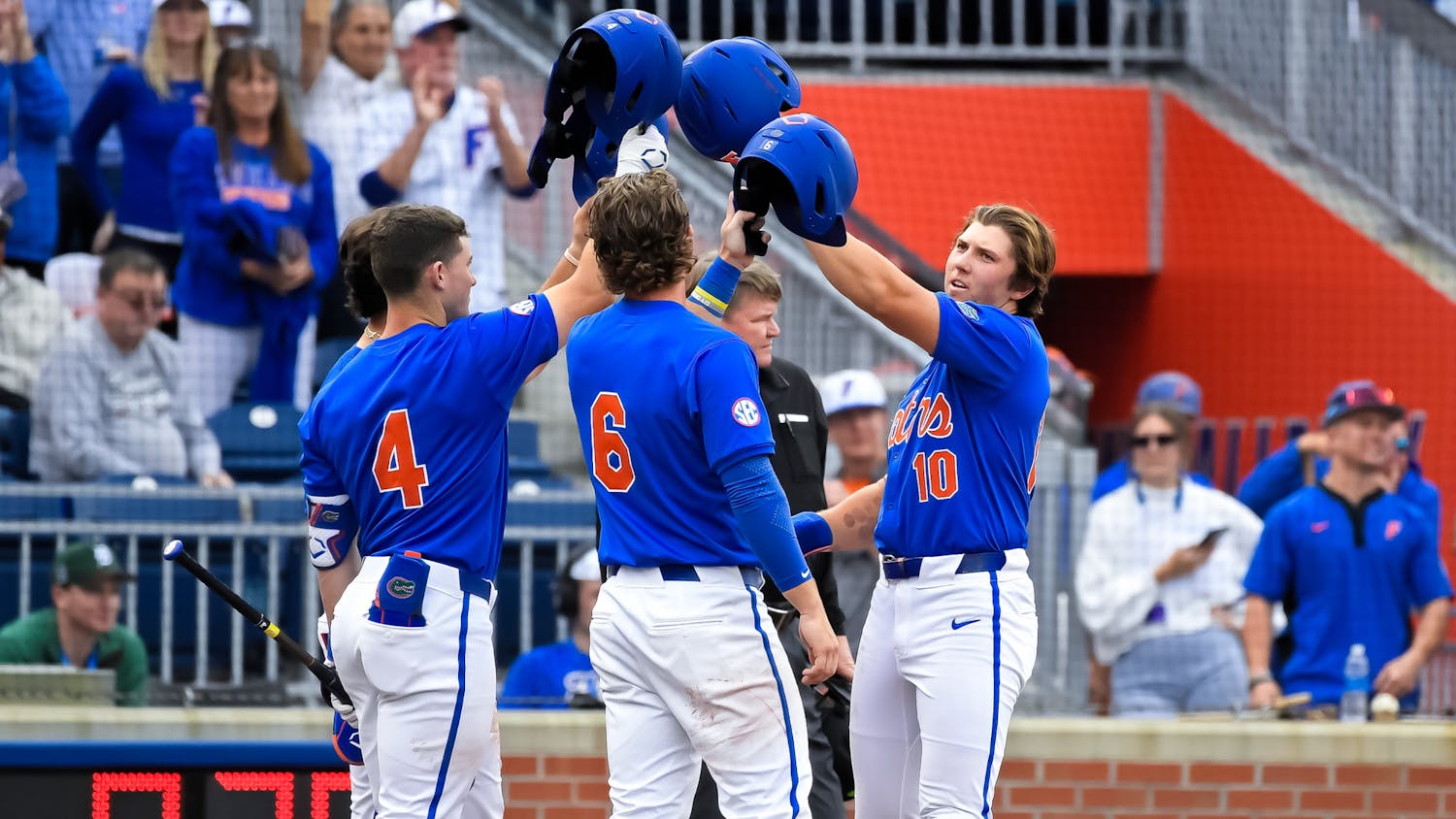Editor’s Note: All of the interviews with immigrants were conducted in Spanish. In order to protect their safety, their last names have been omitted.
When Fernando left his home in Vera Cruz, Mexico, five years ago, he was searching for an adventure. An American adventure.
The 24-year-old looks back at his naivety now and laughs. His longed-for adventure ended up consisting of getting caught by the border patrol and being mugged by gangs along the way.
He finally did make it to the other side, but that’s where the biggest problem awaited him.
He couldn’t talk to anyone. He couldn’t understand anyone. The charming storyteller with the Mario Lopez smile was, effectively, mute.
Fast-forward five years.
Fernando has an English teacher. Once a week, she teaches him how to conjugate verbs and pronounce words like “flirt.” They go over worksheets, talk about expressions he’s heard throughout the week and laugh when they don’t understand each other.
And it’s all free.
Fernando is just one of the immigrants benefiting from Project Progress, a group of 10 to 15 UF students who spend their Tuesday nights teaching English.
The students-turned-teachers are members of CHISPAS, a student organization at UF determined to bring change to the immigrant community. They formed Project Progress because they think the ability to speak English can and will spark a change.
CHISPAS means sparks, after all.
Every Tuesday night, they drive out to La Iglesia Adventista del Séptimo Día de Gainesville, just one of the dozens of churches lining 39th Avenue. They break the 25 to 30 students into pairs or instruct them one-on-one, depending on how many people show up.
Then, from 7 p.m. to 9 p.m., they speak English.
For this immigrant church, that is unusual. Spanish is the mother tongue, or “la lengua materna” there. Most members who can answer a question in English prefer to do so in Spanish, saying they can express themselves better in their heart language.
But Tuesdays are an exception. In fact, Tuesday nights are a break from most norms.
College students give up their nights to teach English to immigrants. A church is converted into a classroom. Students make their inexperienced teachers guava empanadas and thank them after every lesson.
So when it comes to the small things, Gisselle Martinez doesn’t worry. Martinez, the educational director of Project Progress, knows there’s a much bigger picture.
The 23-year-old Colombian had to learn English herself. She knows the immigrants don’t necessarily need a perfect program, certified teachers or even language and linguistics majors.
There’s more to it than that.
“I want people who care,” she said.
***
Every Tuesday night, Lily Rosales scans the room filled with young immigrants.
Officially, Rosales is director of health and temperance at the church, but everyone knows her role isn’t confined to that. The 54-year-old acts as somewhat of a mother figure here, making the younger men lunch and shaking her finger at them when they need to be set straight.
It’s an unspoken rule: Skip English class and you have to deal with Rosales.
“They prefer to come to class,” she says, grinning.
Before Rosales had her way, Project Progress only offered classes at UF’s Law School. Rosales sent a few emails to Martinez, who quickly agreed to add another day of classes and move them out to the church. The church is located three miles past the interstate, distancing itself from the rest of the churches.
There aren’t any street lights lining the road, but small spotlights keep the church lit at all times. There are almost always cars in the dirt parking lot.
Rosales was sure that would be the case Tuesday nights. Her Mexican boys wouldn’t go out to UF’s campus, but they would come to church, she reasoned.
“They’re landscapers, painters, and construction workers,” she explained. “To them, the university is untouchable.”
Rosales announced in August that Project Progress would offer classes at the church. That week, 20 to 30 members carpooled and walked along the side of the road to get to class.
It was a small shock for the teachers. They usually have six to seven students show up at the law school.
Fernando was among the first group of students. His teacher was Andrene Cross, a UF junior who was just as quiet as he was charming. She was 18. He was 24. Her skin tone was chocolate. His was brown.
But they weren’t so different from each other. Cross brought him hymns one time, and they translated the lyrics together. Faith, they’ve found, is something they connect on.
“We feel more comfortable with each other now,” Cross says.
All the immigrants who attend Project Progress go to the church as well. They read passages from the Bible together, attend Wednesday night prayer meetings in dress shirts and still-wet hair, and eat Rosales’ gallo pinto together after the Saturday service.
Their countries, families and personalities vary. Their shared faith and passion to learn English unites them.
There are a few older students whose experiences in life include education and stable jobs. The majority, though, are boys in their mid-20’s who quickly became men in their transition to America and life as an immigrant.
Like many of the immigrants, Fernando works both a full-time and a half-time job, the half-time job taking up 32 hours weekly.
His ability to speak English has gone from nonexistent to conversational in the past two and a half years, something he credits to a patient previous co-worker and his current teacher at Project Progress.
But Fernando isn’t satisfied. He still has a hard time understanding some of his co-workers, and sometimes they have a hard time understanding him.
Ironically, he takes a night off work to find better work. Fernando remembers a foreman from a previous job he had. Like Fernando, the foreman didn’t have papers.
The difference between him and Fernando? He spoke “good English.”
Fernando raises an eyebrow, “He can make $25 an hour.”
***
One day, a co-worker tapped Fernando on the shoulder while he was reading his Bible during break.
“Pray for me,” he told Fernando.
Fernando froze, dumbfounded at the realization his co-worker’s request had brought on: He didn’t know how.
Not in English, at least.
Like Fernando, most of the students at Project Progress are reminded of the communication barrier between them and other Americans on a day-to-day basis.
Celestina’s reminder comes hourly.
From the lady at the checkout line to the dentist to the stranger on the street, Celestina hasn’t known what is being said to her for the past 10 years. Her world is one of polite smiles, avoided eye contact and constant guessing.
Her children have started to learn English in school. Her 7-year-old daughter, Cynthia, fills in the blanks for her now, translating anything from school notes to consultations with the doctor.
But Celestina is the mom. She’s 37 years old, and she doesn’t want to be dependent on Cynthia.
“I want to know for myself,” she says.
So on Tuesdays, Celestina works at her cleaning job until 4:30 p.m., picks her kids up from school, eats dinner with her family, and then leaves her kids with her husband.
She goes to English class alone. She is one of the only women who attends.
She’s learning the basics. Where are you from? How are you? How old are you? What is your name?
She says she knows a lot of the questions. She still doesn’t know the answers.
One day, she says she’ll have a conversation with one of her children’s teachers. For now, she has a hard time even speaking in English out loud.
“I don’t know why,” she says of her fear.
Educational director Martinez remembers what it was like to not understand her teachers. Directly after she moved from Colombia, she began to attend school.
The first day of school, she and her twin watched, dumbfounded, as all of the students began to leave their desks and then the classroom. In Colombia, all of the classes are held in the same room.
“It was hard,” she said of the transition.
Like Martinez, many Project Progress teachers can relate to their students’ frustrations because they’ve had to learn English themselves.
Ilse Paniagua left her home in Mexico City when she was 13 years old. The 20-year-old is passionate about Project Progress because she knows most of the students can’t afford to pay for classes.
She teaches Pablo, a 21-year-old who just recently found the courage to speak to her in English. Paniagua doesn’t always know what she should do to help Pablo learn, but she gives what she has.
“The best technique is just time,” she said.
For Gamaliel, a 25-year-old Mexican immigrant, time has a funny sense of humor.
He moved from Chiapas, Mexico to Gainesville when he was 19 years old. His plan was to work for one year and save up enough money to pay for school. Then he would return to Mexico.
But six years later, he’s found himself in an entirely different classroom than he had planned.
“I don’t know,” he says, smiling softly. “I can’t explain it. I just stayed.”
He wants to learn English so he can talk to the other workers at his job. All the friends Gamaliel came to Gainesville with have moved back to Mexico in the six years he’s been here.
His weeks are taken up by 45 hours of work and church now.
But there are two hours that he, along with Celestina, Fernando and Rosales, will continue to set aside for Project Progress.
“What they do is give classes,” he said, summarizing their work, “and it’s beautiful.”
UF accounting freshman Vanessa Colchado, 19, helps a student prepare for the GED exams at Iglesia Adventista del Septimo Dia de Gainesville on Tuesday evening.






